Chinese Premier Wen Jiabao Calls for Urgent Political Reform, Hails Democracy

Chinese Premier Wen Jiabao called for urgent reform of the country's political system Wednesday, saying democracy in the one-party state is inevitable during an unusually candid television interview that revisited previous declarations of reform.
Wen warned that the country must change its leadership structure or risk a return to the dark days of the Cultural Revolution of the 1960s.
Mistakes like the Cultural Revolution may happen again. Any government official or party member with a sense of responsibility should recognize this, he said, according to Britain's Daily Telegraph.
While Wen's comments were rather provocative, he has actually made such overtures to political reform before, with little to show for it.
For example, in 2007, during a press conference at the National People's Congress, he stated that democracy is one of the basic goals of the Socialist system.”
In the following year, Wen admitted that Chinese democracy needed to be overhauled and that power “truly belongs to the people.”
While he has sometimes incurred the wrath of conservative elements within the Chinese Communist Party (who have on at least two occasions censored his comments), such declarations from Wen have not led to any real meaningful moves for reform.
Some critics, however, have reacted to the latest comments with cautious optimism.
Nicholas Bequelin, senior Asia researcher at Human Rights Watch, said the frank remarks were the strongest indication yet that the outgoing premier was serious about reform.
The reference to the risk of a new Cultural Revolution is the strongest statement ever made by Wen Jiabao on the urgency of carrying out political reforms, he said, according to the China Post.
By political reforms he doesn't mean democratization but rather a series of reforms that go beyond technocratic tinkering -- establishing a real rule of law, enfranchising workers.
Willy Lam, a leading China expert at the Chinese University of Hong Kong, said Wen's rhetoric was less about wide-ranging structural reforms, and have more to do with the struggle between the Communist Party and the government.
The subtext is that the party has too much power, the party is interfering in the work of the government, he told Agence France Presse.
He wants to reiterate the importance of separation of power and government.
Since Wen is on the verge of exiting the political stage later this year, he has little to lose by making provocative statements about reform and democracy.
Wen also cautioned against several problems emerging in 21st century China, including the rising wealth gap, institutional corruption and a deep-seated public distrust of government.
According to China's Xinhua news agency, Wen warned that without a successful political reform, it's impossible for China to fully institute economic reform and the gains we have made in these areas may be lost, and new problems that popped up in the Chinese society will not be fundamentally resolved.”
He added: The reform can only go forward and must not stand still, less go backwards because that offers no way out.
But, he added, any reforms must follow a step-by-step process in line with China's circumstances.
Interestingly, Wen also referenced the southern Chinese village of Wukan, where citizens threw out their Communist Party secretary and held open elections last year.
If a people can run a village well, I like to think that they could run a town, Wen said.
And if they can run a town, they can manage a country. We should follow such a road, to encourage people's bold practice and allow them to receive training.
Addressing criticism surrounding his rule, Wen adopted a humble, almost apologetic tone throughout the interview.
Due to my incompetent abilities and institutional and other factors, there is still much room for improvement in my work. I often feel that much work remains to be finished, many things have yet to be properly addressed, and there are many regrets, he added.
© Copyright IBTimes 2025. All rights reserved.





















